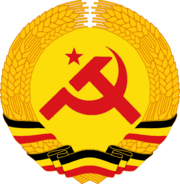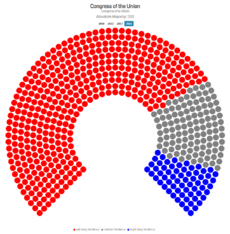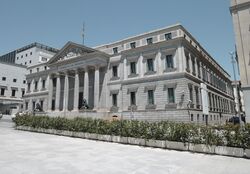Parliament of Eothasia: Difference between revisions
No edit summary |
No edit summary |
||
| Line 1: | Line 1: | ||
{{Infobox legislature | {{Infobox legislature | ||
| name = [https://public.flourish.studio/visualisation/1397710/ Congress of the Republic] | | name = [https://public.flourish.studio/visualisation/1397710/ Congress of the Republic] | ||
| native_name = ''Congreso d'la | | native_name = ''Congreso d'la República'' | ||
| legislature = <small>''(LXXXIX Corts)''</small> | | legislature = <small>''(LXXXIX Corts)''</small> | ||
| coa_pic = UESRCoA2.png | | coa_pic = UESRCoA2.png | ||
| Line 22: | Line 22: | ||
| members = 605 Deputies | | members = 605 Deputies | ||
| house1 = [https://public.flourish.studio/visualisation/1397710/ National Assembly] | | house1 = [https://public.flourish.studio/visualisation/1397710/ National Assembly] | ||
| structure1 = | | structure1 = CotU.png | ||
| structure1_res = 230px | | structure1_res = 230px | ||
| political_groups1 = {{colorbox|red}} Left Wing Tendency [428]<br />{{colorbox|gray}} Centrist Tendency [113]<br />{{colorbox|blue}} Right Wing Tendency [64] | last_election1 = May 4, 2017 | | political_groups1 = {{colorbox|red}} Left Wing Tendency [428]<br />{{colorbox|gray}} Centrist Tendency [113]<br />{{colorbox|blue}} Right Wing Tendency [64] | last_election1 = May 4, 2017 | ||
| Line 31: | Line 31: | ||
}} | }} | ||
The Congress of the Republic [Eothasi: ''Congreso d’la | The Congress of the Republic [Eothasi: ''Congreso d’la República''] are the legislative branch of the United Eothasi Socialist Republics. It is a unicameral organism composed exclusively by the National Assembly of the Republic. | ||
The National Assembly is a uninominal constituencies system. The entire country is divided into 605 constituencies; each constituencies proposes one candidate to the National Assembly, which will act as that constituencies’ particular representation in the National Assembly. As such, all members are independents and there are no parties in the Eothasi political system. In order to ensure that not only higher-class individuals are able to attempt election due to the costs of the electoral campaigns, the federal government has ensured the following rules: (1) candidates for elections must not draw funds for their campaigns from personal accounts, but exclusively from donations of members that must reside within the region that they represent; (2) the ruling government of the | The National Assembly is a uninominal constituencies system. The entire country is divided into 605 constituencies; each constituencies proposes one candidate to the National Assembly, which will act as that constituencies’ particular representation in the National Assembly. As such, all members are independents and there are no parties in the Eothasi political system. In order to ensure that not only higher-class individuals are able to attempt election due to the costs of the electoral campaigns, the federal government has ensured the following rules: (1) candidates for elections must not draw funds for their campaigns from personal accounts, but exclusively from donations of members that must reside within the region that they represent; (2) the ruling government of the Popular Republic to which a specific constituencies belongs must ensure that local debates are conducted to ensure visibility of all candidates; (3) small subsidies are provided to candidates in a second consecutive candidacy. | ||
Members of the Congress of the Republic are voted directly by the citizens of the country. These elections occur once every four years and the entirety of the National Assembly is up for vote at the same time. In order to become a representative of either house of the Congress of the Republic, it is necessary for an individual to be of Eothasi birth and to have obtained, at minimum, the Vexian Citizenship Tier. | Members of the Congress of the Republic are voted directly by the citizens of the country. These elections occur once every four years and the entirety of the National Assembly is up for vote at the same time. In order to become a representative of either house of the Congress of the Republic, it is necessary for an individual to be of Eothasi birth and to have obtained, at minimum, the Vexian Citizenship Tier. | ||
Revision as of 18:52, 21 March 2020
| Congreso d'la República | |
|---|---|
| (LXXXIX Corts) | |
 | |
| Type | |
| Type | |
| Leadership | |
Premier of the Republic | Priscilla Poriér since Election: January 1st, 2004 |
Chancellor of the Republic | Chellick Coltys since Election: April 1st, 2007 |
First Secretary of the Republic | Valerius Eäron since Election: January 1st, 2011 |
President of the Government of the National Assembly | Deputy Miguela Romà since May 5th, 2017 |
| Structure | |
| Seats | 605 Deputies |
 | |
National Assembly political groups | Left Wing Tendency [428] Centrist Tendency [113] Right Wing Tendency [64] |
| Elections | |
National Assembly last election | May 4, 2017 |
Last election | May 4, 2017 |
| Meeting place | |
 | |
| Capitolium, Elidani, Eothasia | |
The Congress of the Republic [Eothasi: Congreso d’la República] are the legislative branch of the United Eothasi Socialist Republics. It is a unicameral organism composed exclusively by the National Assembly of the Republic.
The National Assembly is a uninominal constituencies system. The entire country is divided into 605 constituencies; each constituencies proposes one candidate to the National Assembly, which will act as that constituencies’ particular representation in the National Assembly. As such, all members are independents and there are no parties in the Eothasi political system. In order to ensure that not only higher-class individuals are able to attempt election due to the costs of the electoral campaigns, the federal government has ensured the following rules: (1) candidates for elections must not draw funds for their campaigns from personal accounts, but exclusively from donations of members that must reside within the region that they represent; (2) the ruling government of the Popular Republic to which a specific constituencies belongs must ensure that local debates are conducted to ensure visibility of all candidates; (3) small subsidies are provided to candidates in a second consecutive candidacy.
Members of the Congress of the Republic are voted directly by the citizens of the country. These elections occur once every four years and the entirety of the National Assembly is up for vote at the same time. In order to become a representative of either house of the Congress of the Republic, it is necessary for an individual to be of Eothasi birth and to have obtained, at minimum, the Vexian Citizenship Tier.
History
Following the end of the Civil War and the rise of power of the future Empress Duvaineth, it was decided that the only way to truly advance united was precisely to undo the union of the Aterni Empire that had conquered all of modern-day Eothasia, instead creating a new government that would equally represent all Eothasi citizens. This government would be a democratic and meritocratic organization that would only permit those with valuable work ethics and meritable achievements to ascend the ranks.
As such, the government was established with a clear separation of powers between executive, legislative, and judiciary powers officially in 1681. The Congress of the Republic took on the mantle of the legislative branch of government. Since then, there have been 89 different compositions of the Congress, including the presently active.
In the late 17th Century, after the official selection of Elidani as the capital of the newly formed United Eothasi Socialist Republics, the construction of the Capitolium — the building where, to this day, the Congress of the Republic convene for sessions — began. It was completed by 1701 and the first session was held in May 10, 1701 by the 6th Congress of the Republic.
Privileges and Pay
Privileges
Members of the Congress of the Republic have a series of privileges due to their position within the Eothasi government. These include freedom from arrest except in cases of treason, felony, and disturbance of the peace
Pay
The gross salary of all members of the Congress of the Republic is 53.956,18ℭ. This does not include commissions (such as those for National Assembly Speaker, which receives an amount close to 30.000,00ℭ). There are also a series of indemnizations for distance (the members of the Court that are from regions farthest away from Elidani receive more than those closer to the capital).